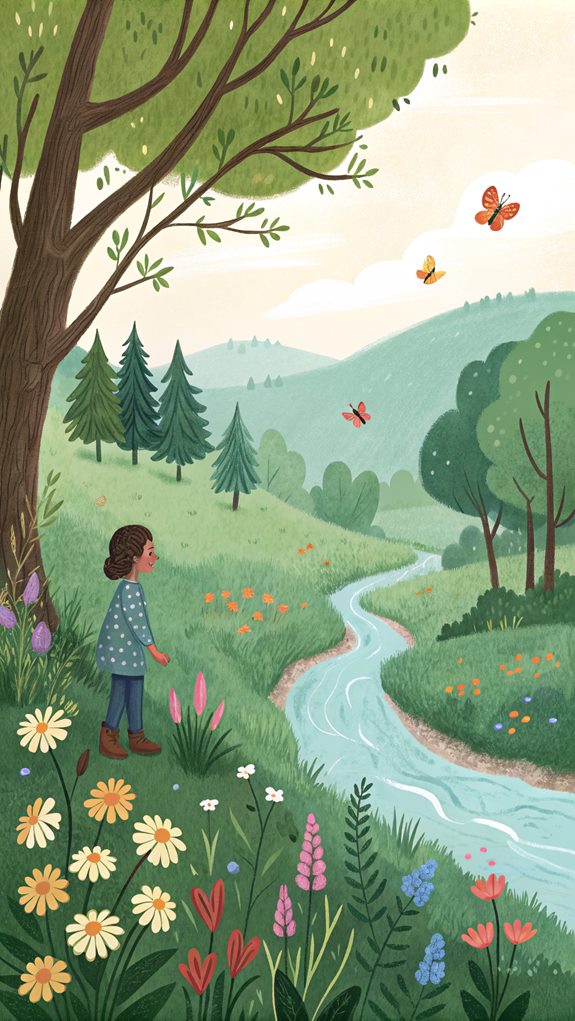Parents, listen up! You should tell your kids that lifelong learning is like a superpower—curiosity is key! Failure? It’s just a fancy way of saying “Let’s try again!” Teach them to accept it! Healthy friendships? They’re worth their weight in gold, so help ’em communicate better. And don’t forget about eating right and exercising; pizza can’t be every meal! Financial smarts are crucial, too—saving a few bucks now can pay off later. Most of all, encourage honesty, positivity, and adaptability in their lives. Trust me, these nuggets of wisdom will prep them for the wild ride ahead! You won’t want to miss what’s next!
Key Takeaways
- Embrace failure as a learning opportunity and develop resilience to overcome challenges.
- Cultivate curiosity and a love for learning through varied experiences and reading.
- Practice empathy and kindness, understanding others’ feelings and perspectives.
- Prioritize mental and physical health with regular exercise, healthy eating, and mindfulness.
- Maintain integrity and honesty; they are foundational values for building trust and accountability.
Cultivate Lifelong Learning

Cultivating a love for lifelong learning in your children is one of the best gifts you can give them. You see, if you encourage curiosity, they’ll never stop exploring the world around them.
Start by nurturing a love for reading. Grab some books that spark their interests; studies show kids who read regularly perform better academically.
Next, pay attention to varied learning experiences outside the classroom. Whether it’s hands-on science experiments or community programs, these activities can enhance their critical thinking skills.
And while you’re at it, promote the habit of setting personal learning goals. Kids who set goals tend to be more motivated—who doesn’t love checking things off a list?
Always remember to model a lifelong learning mindset yourself. Share your own educational pursuits, whether it’s learning a new recipe or diving into a fascinating documentary. Your enthusiasm will inspire them.
Lastly, remind them that learning doesn’t stop when they face challenges. It’s all part of the process. Accept it, laugh about it, and keep moving forward.
Embrace Failure and Resilience
Failure is often seen as a setback, but in reality, it’s an essential part of growth and learning.
Think about it—everyone messes up sometimes, even the pros. When your child stumbles, remind them it’s not the end of the world. It’s a chance to bounce back stronger! Embracing failure helps them build resilience.
Research shows that kids who get this are more likely to stick with their goals. Instead of feeling defeated, they’ll see setbacks as opportunities to grow. You can help them by encouraging a growth mindset. Let them know effort counts far more than talent.
Share stories of your own failures—trust me, it’s way better than trying to be perfect! When kids see you struggle and rise again, they’ll know they can do the same. Plus, who doesn’t love a good comeback story?
Teaching them emotional regulation and problem-solving skills will equip them to handle life’s curveballs.
Foster Healthy Relationships

Building resilience in your child also means teaching them how to cultivate healthy relationships. Think of it like planting a garden; you’ve gotta water those seeds of empathy, communication, and conflict resolution! Here’s a handy table to keep in mind:
| Skill | Why It Matters | How to Practice It |
|---|---|---|
| Effective Communication | Helps kids express feelings clearly | Regularly check in with your child |
| Emotional Intelligence | Teaches empathy and understanding | Discuss different viewpoints |
| Conflict Resolution | Prepares them for disagreements | Teach respectful guidance of arguments |
Encourage your child to share their thoughts and feelings. Create a safe space for them to talk without fear of judgment. Show them the power of empathy by discussing how their actions affect others. When conflict arises, guide them on how to resolve it respectfully. Remember, modeling healthy relationships is key—you’re their biggest role model!
Also, set up playdates or group activities. This way, they can practice sharing, taking turns, and building friendships. It’s a win-win: they learn, and you get a little peace and quiet!
Prioritize Mental and Physical Health
Prioritizing your child’s mental and physical health is essential for their overall well-being and development. Let’s face it: happy kids are the best kind of kids!
Start by encouraging good exercise habits. Aim for at least 60 minutes of playtime or sports daily. Whether it’s a game of tag or a dance-off in the living room, moving is key!
Next up, healthy eating. Stock your kitchen with colorful fruits, crunchy veggies, and whole grains. Think of it as fueling up a race car—your child needs the right stuff to zoom through their day!
Don’t forget about mental wellness. Open up those lines of communication. Ask them how they feel, and let them know it’s okay to talk about their emotions. If they’re feeling stressed, suggest some fun mindfulness practices, like deep breathing or silly meditation (yes, it can be silly!).
And let’s not skip sleep. A consistent bedtime helps them recharge. Aim for 9-11 hours a night. Trust me, you’ll notice a happier, more focused kiddo!
When you prioritize these areas, you’re setting them up for a lifetime of health and happiness.
Develop Financial Literacy

Once your child’s mental and physical well-being is on track, it’s time to turn your attention to developing their financial literacy. You might think money talks are boring, but they’re super important!
Start with budgeting basics. Show them how to track their income and expenses. Encourage them to save at least 20% of their allowance—who knew saving could be a thing?
Next, get them excited about saving strategies. Help them set short-term and long-term financial goals, like a shiny new toy or college funds. This helps them see the magic of waiting and saving for what they really want.
Don’t forget to explain credit and debt management. Teach them about interest rates so they can make smart choices in the future.
Opening a savings account is a fun way to see their money grow over time. They’ll learn about interest accumulation, which is like watching grass grow—only way cooler!
Practice Empathy and Kindness
Empathy and kindness are essential skills that can shape your child’s character and relationships. Teaching your child to recognize and understand others’ feelings nurtures empathy, which helps them maneuver social interactions smoothly. Plus, acts of kindness make everyone feel warm and fuzzy inside—who doesn’t love that?
Try these fun activities to enhance their empathy and kindness:
| Empathy Exercises | Kindness Challenges |
|---|---|
| Role-play different scenarios | Help a neighbor with groceries |
| Discuss feelings in books | Write a thank-you note to a teacher |
| Play “What Would You Do?” | Organize a community clean-up |
| Share stories about helping others | Donate toys to kids in need |
Perspective-taking activities can work wonders, too. Encourage your child to think about how someone else might feel in a given situation. Create an environment where kindness is celebrated—model it, and watch them soak it up like a sponge!
You’ll see them grow into caring individuals who understand the power of empathy and kindness, leading to happier lives. Who knew teaching these skills could be so rewarding—and fun?
Encourage Self-Discovery and Passion

Encouraging self-exploration and passion in your child is essential for their personal growth and happiness. You want them to feel excited about life, right?
So, let’s help them delve into hobbies, identify strengths, and pursue interests that light a fire in their hearts. Here are some tips to get you started:
- Investigate Various Activities: Encourage your kid to try out different things. Whether it’s painting, coding, or karate, the more they try, the better they can pinpoint what they love.
- Set Personal Goals: Help them set achievable goals related to their interests. It’s like having a treasure map—each goal is a step toward uncovering their passion!
- Celebrate Effort: Praise your child for their hard work and resilience, not just the end result. This way, they’ll learn that sticking with something, even when it’s tough, is part of the expedition.
And remember, it’s totally okay if their passions change over time. Life’s a buffet of experiences, and it’s all about finding what makes them happy!
Maintain Integrity and Honesty
Instilling integrity and honesty in your child lays a strong foundation for their character and future relationships. Think about it: kids who learn to do the right thing, even when no one’s peeking, are more likely to rock their careers and friendships later on. So, how can you help them steer through those tricky moral dilemmas?
Here’s a quick guide for you:
| Action | Impact | Why It Matters |
|---|---|---|
| Be a role model | Kids imitate what they see | They’ll learn honesty from your actions! |
| Promote open chats | Builds trust and emotional health | Trust leads to stronger relationships. |
| Discuss consequences | Understand the cost of dishonesty | Lying can lead to guilt and anxiety. |
Encourage your child to express their thoughts and feelings. Transparent communication isn’t just a fancy term; it’s the glue that holds connections together. And remember, when you’re honest and transparent, you’re not just building a trust bank; you’re also teaching them that honesty really is the best policy!
Nurture a Positive Mindset

Building on the foundation of integrity and honesty, nurturing a positive mindset in your child is equally important. After all, we want them to face life with a grin, not a grimace!
Here are a few ideas to help them cultivate that sunny outlook:
- Gratitude Practices: Encourage your child to jot down three things they’re thankful for each day. It could be anything from their favorite snack to a sunny day. Trust me, it works wonders for happiness!
- Positive Affirmations: Teach them to talk to themselves like they’re their own biggest fan. Phrases like “I can do this!” can help enhance self-esteem and resilience. Who doesn’t want a personal cheerleader?
- Optimistic Thinking: Show them that failures are just stepping stones to success. Help them see that setbacks are temporary and solvable. When they face challenges, remind them of the growth that comes from trying again.
And don’t forget to model this behavior yourself! Kids learn best by watching you.
Embrace Change and Adaptability
When life throws unexpected changes your way, it’s crucial to help your child see these moments not as setbacks, but as opportunities for growth. Teaching them to change viewpoints and welcome adaptability skills can turn challenges into fun experiences. So, how do you do that? Let’s break it down!
| Change Viewpoint | Adaptability Skills | Growth Mindset |
|---|---|---|
| View change as fun! | Try new things together | Mistakes are learning! |
| Ask, “What’s the upside?” | Role-play different scenarios | Celebrate effort, not just success! |
| Share your own stories | Encourage creative solutions | Stay curious and open! |
| Discuss what’s normal | Learn to pivot quickly | Believe in your abilities! |
| Keep it light-hearted | Build new routines | Focus on the experience! |
Welcome the bumps in the road. When kids step outside their comfort zones, they grow. Plus, open talks about change help them tackle future challenges with a smile. Remind them that adaptability is like a superpower—one that can lead to awesome experiences and resilience in the face of life’s curveballs!
Share On X
Conclusion
So, remember, parenting isn’t about perfection—it’s about progress! Teach your kids to learn from their mistakes, like when Timmy tried to bake a cake and ended up with a volcanic mess. Instead of a snack, he got a lesson in resilience! Help them welcome change, be honest, and chase their passions. By doing this, you’re setting them up for a life full of growth and laughter. Who knew parenting could be a recipe for fun and wisdom?
Join our list
Subscribe to our mailing list and get interesting stuff and updates to your email inbox.

